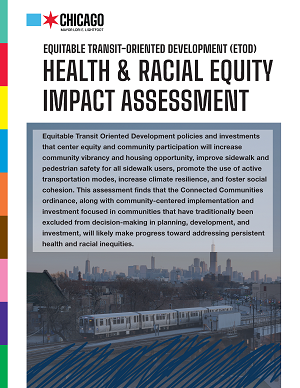ETOD Health & Racial Equity Impact Assessment (HREIA)
From October 2021 to March 2022, the Chicago Department of Public Health (CDPH) and the Illinois Public Health Institute (IPHI) engaged people who live near high-frequency transit routes in communities facing disinvestment and displacement pressures, youth leaders, and the City’s Disability Advisory Committee to identify the ways that ETOD can impact health and race equity across the city. This process affirmed that policies like the Connected Communities Ordinance that center equity and community participation will likely increase community vibrancy and housing opportunity, improve pedestrian safety, promote the use of active transportation modes, increase climate resilience, and foster social cohesion.
Download the HREIA report here
The HREIA ultimately identified recommendations for ETOD policy and implementation. Most importantly, the HREIA process underscored the importance of building strong partnerships between community representatives in Black, Latinx, Asian and Indigenous communities, City departments, elected officials, and the private and civic sectors to advance equitable investment and implementation of ETOD. Community members with specific expertise on transit and development – such as youth, people with disabilities, low-wage workers, and older adults – should continue to have a strong voice in decision-making.

